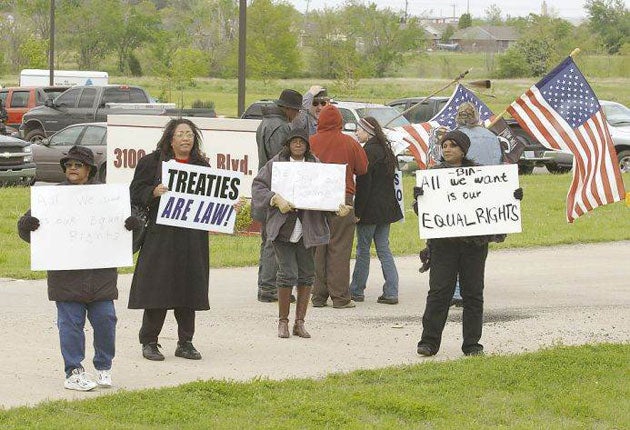Cherokee Nation runs into constitutional hot water over voting ban

Your support helps us to tell the story
From reproductive rights to climate change to Big Tech, The Independent is on the ground when the story is developing. Whether it's investigating the financials of Elon Musk's pro-Trump PAC or producing our latest documentary, 'The A Word', which shines a light on the American women fighting for reproductive rights, we know how important it is to parse out the facts from the messaging.
At such a critical moment in US history, we need reporters on the ground. Your donation allows us to keep sending journalists to speak to both sides of the story.
The Independent is trusted by Americans across the entire political spectrum. And unlike many other quality news outlets, we choose not to lock Americans out of our reporting and analysis with paywalls. We believe quality journalism should be available to everyone, paid for by those who can afford it.
Your support makes all the difference.The Cherokee Nation was struggling to find its way out of a controversy yesterday sparked by a decision earlier this month to eject the nearly 3,000 black members of the tribe and bar them from voting in elections for a new chief.
The Nation had sent letters to its so-called freedmen members, who are descended from slaves owned by Cherokees up until the end of the Civil War, informing them that they were being stripped of tribal status. The federal government quickly warned the action was illegal and would be met with sanctions.
The clash came to a head this week when the Nation was admonished in a letter from the head of the Bureau of Indian Affairs, Larry Echo Hawk.
"I urge you to consider carefully the Nation's next steps in proceeding with an election that does not comply with federal law," he wrote. "The department will not recognise any action taken by the Nation that is inconsistent with these principles and does not accord its freedmen members full rights of citizenship."
Mr Hawk said the elections, on 24 September, would go unrecognised by Washington unless the freedmen were reinstated and allowed to participate. Already $30 million (£19m) in federal housing funds bound for the Cherokee Nation have been frozen. The government says the Nation is in violation of an 1866 treaty it signed with the federal government that guaranteed full tribal status to the former slaves.
The election is being fought by former Nation Chief, Chad Smith, and tribal council member Bill John Baker. A ballot was held in June but fluctuations in the final tallies led the Nation's elections commission to void the results and call a second election for September.
In the first glimmerings of a compromise, the nine-member election commission agreed on Wednesday to allow the freedmen to cast provisional ballots next week on the understanding that they would either be counted or shredded depending on the outcome of a federal court ruling on the issue expected next week in Washington.
The position of the freedmen was first imperilled by a 2007 Cherokee referendum in which 76 per cent of the voters agreed to remove them and other non-Indians from the tribal rolls, excluding all those without direct Cherokee bloodlines. However, no action was taken until recently when the results of that vote were upheld by the Nation's top justices. The freedmen were not only barred from voting but also denied all future social benefits, including healthcare support, funded partly by the Nation's casinos.
The step led to charges of racism and greed. The freedmen are pinning their hopes on next week's federal court hearing. "The freedmen people still have rights in the tribe such as voting," said Marilyn Vann, president of the Descendants of Freedmen of the Five Civilised Tribes. "We'll have our day in court."
Join our commenting forum
Join thought-provoking conversations, follow other Independent readers and see their replies
Comments